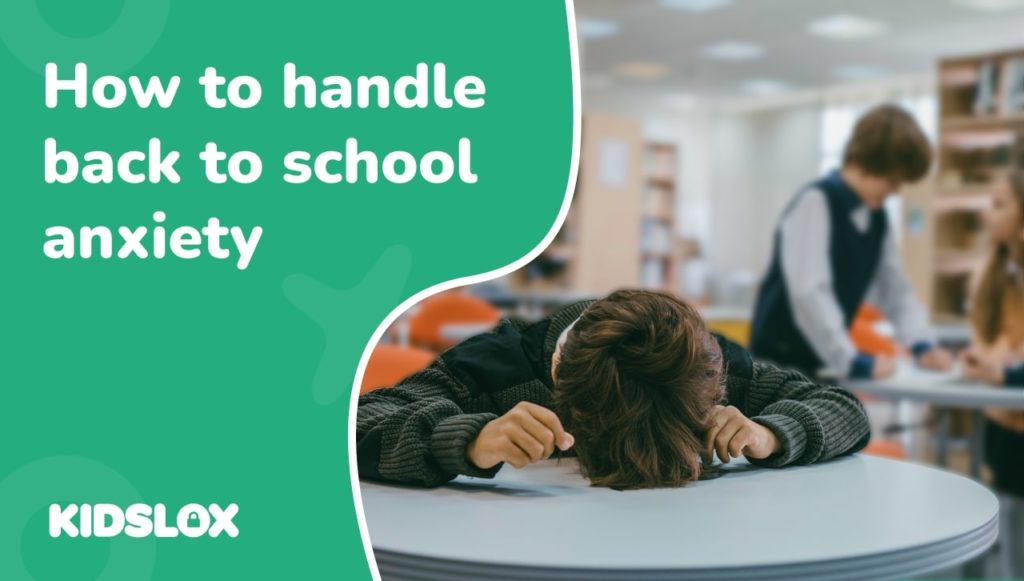The end of summer and the big switch back to school is an important calendar moment for children of all ages and their families. Many feel stressed and worried about the ‘first day back’. Even the most confident of kids can feel anxious and apprehensive about what lies ahead at the start of a new semester.
If the past few years have been turbulent for us adults, for our kids, they’ve been a whirlwind. Lockdowns, inconsistent face-to-face teaching, and the fear of illness hanging over us all, has created a backdrop of anxiety and stress that is unique to this current generation of school children.
It’s little wonder that so many will be approaching the new school year with an added sense of worry this September.
Why are children anxious to go back to school?
School takes up the majority of your child’s time and is the central routine in their young lives. It also presents a lot of milestones – from exam season to learning new skills, there is a lot of pressure when it comes to doing well, fitting in and being a good student.
From new social relationships, a change in teachers and the prospect of new academic challenges, there are plenty of reasons why children might be nervous to start back at school this fall.
Kids who are more shy and anxious by nature might exhibit these behaviors more readily than their extroverted peers, but even the most outgoing of children can find the transition back to school a really daunting time.
If it’s a pivotal year for grades, college applications, sports team try-outs or other extra-curricular activities, these are all reasons why your child might be feeling extra anxious ahead of the first semester of the new school year.
What are the signs of a child who’s got back to school anxiety?
A little bit of nervousness is normal. Talking a lot, building up stories about peers or legendary teachers, infamous other students and the like all contribute to the ground swell of apprehension for the first day back.
This can continue for a few weeks too. Especially if it’s a completely new start for a child. Settling into new routines, new buildings, new routes to school and new pressures can be a challenge.
But if it goes on longer than that, or you feel that your child is more anxious than normal, it may be that they need some additional support to get settled.
Psychologist Erika Chiappini from Johns Hopkins Children’s Center asks parents to be extra cautious if their child is showing any of the following signs:
- Lots of emotion or ‘tantrums’ when they are separated from you or another caregiver to go to school
- Challenges with behavior and relationships with family and friends
- Avoiding doing routine things at school and at home
- Physical symptoms, including stomach pain, tiredness and challenges sleeping on their own
Back to school anxiety for parents
It’s not just children who feel stressed and anxious about school, parents can often feel worried around this time of year too. If that sounds familiar, you’re not alone.
Perhaps you worry about your child (and wider family) catching bugs and illnesses as they go back to mixing with peers. One way to keep that stress under control is by ensuring your child is as up to date as possible with their vaccinations. And that they practice regular, and optimal hygiene habits like handwashing, throwing away their tissues and not sharing things like drinks and snack bars with others.
Another common anxiety for parents is the worry that their child will experience bullying. While childhood fallouts are par for the course in the school yard, cyberbullying is one of parent’s top concerns for their kids. Ensure that you have done a thorough audit of your child’s social media accounts, set their profiles to private and have had an open discussion about netiquette. In addition, parental control apps like Kidslox can help give you an added layer of peace of mind by setting limits and keeping tabs on your child’s location.
That leads us on to another key cause of stress for parents, letting your child have new freedoms, including going to school alone. If you’re used to dropping your kids off at the gate, and are looking ahead to a completely new journey where your child is using public transport, or walking with friends, having a location tracking app will enable you to be able to see where your child is with the click of a button.
How to deal with back to school anxiety
The way to approach back to school stress and anxiety for children will differ according to their age, and particular worries. In this guide we’ll explore how to support kids from preschool to college with the transition back to learning this fall.
Preparing preschoolers for their first days of school
Starting school for the first time is an exciting milestone for everyone, and can often give us some of our first memories. When it comes to younger children, getting them used to the idea of a new routine by using storybooks about starting school can be a really great way to prime their imaginations.
Let them know who their teacher will be, and keep things really positive. Tell them stories from when you started school, and what your favorite activities were. At this age, play will still feature in their day, so be sure to let them know about the cool new toys they’ll get to experience too.
Early years education is the time when your child will start to learn the building blocks of literacy, but one really cool way of getting them prepared for their first few weeks is to teach them to recognise the way their name looks written down. Most children this age will have their own drawer and coat hook for their belongings, so giving them a headstart on that part of school is a great way to ease any teething troubles.
How to help Elementary and middle schoolers (primary school) feel confident for back to school
During these years children are likely to have forged some friendships and alliances at school, and are getting to grips with their favorite (and least favorite) subjects too.
The main causes of stress and anxiety here are typically around peer interactions, new teachers and perhaps new additions to their curriculum too, like physical education. Try explaining these changes in the weeks ahead, and offer your children the opportunity to meet up with school friends for playdates to catch-up ahead of the first day.
It can be a chance to give your children some more autonomy over their choices too – perhaps a transition to school meals from a packed lunch will give them something fresh to look forward to.
At this age, being able to choose their own stationery, accessories and clothes (within reason!) can be a great way to get them excited about the start of a new school year.
Back to school tips for High Schoolers
This translation, from junior or elementary to high school is the one that’s most often fraught with anxiety. For the bravest, most outgoing of pre-teens, this is new territory and a huge step in their adolescence.
If you don’t remember your first days at high school exactly, you might remember some of the urban legends, myths and rumors that were whispered beforehand? From ritual initiations to the popular kids, and the infamous bullies, much of what children hear about high school can hype them up into a frenzy of worry.
The best way to approach this transition with your pre-teen is to have an open environment for discussion. Get down in the weeds with them and ask what it is that they’re stressed about. Try and work through each one practically, and give your child the tools they need to ask for help if something goes off plan.
If you can put aside some of those worries by emailing the teachers and getting early access to timetables, school maps or finding out if there is anyone they know in their class, that can be a big help towards settling those first day nerves.
Anxiety-beating tips for starting College and University
Although your child might be 18 and a young adult, moving into higher education is a shift that comes with an entire lifestyle change. A lot of teens will be moving away from home for the first time, and will be grappling with cooking, laundry and cleaning up after themselves more than ever before.
You can ease this transition by helping to show them cheap and easy recipes, budgeting skills and letting them know that you’re always there on the end of the phone if they need any support (or ideas on how to handle dorm room diplomacy!).
What to do if your child is very anxious and stressed about school
Many children who have experienced depression or anxiety may be feeling especially anxious about the back to school period, and extra care and attention should be given to help make them feel safe and secure. If your child has said, ‘school gives me depression and anxiety’, it may be worth looking at some additional support to help ease them back into a new school.
Make sure you tell your child’s teacher that they’ve expressed these concerns, and ask for regular check-ins to see how they are doing. Consult with the school psychologist or counselor if they have one, and ensure that there are extra eyes on them throughout the day.
General tips to help deal with the stress of back to school for kids of all ages
Whatever grade your child is entering this September, some of the following tips can be really helpful to make the experience as positive and stress-free as possible.
1. Shop for the basics together
One of the most exciting things for kids starting back at school can be as simple as buying a new pencil case. Make it a date and go to the shops together to get the accessories and extras that your child will need for the year ahead.
2. Walk through the route
If they’re starting a new school and there’s a new journey to take, do some practice runs so they feel really confident before they set off.
3. Ask them if they have worries
Give them the floor to let you know what is on their mind. Go through each point together and ask them the following:
Is what you’re worrying about a fact, or could it happen a different (and more positive) way or perhaps not even happen at all?
And:
If that does happen, what do you think you could do to help make it better?
4. Keep talking
Even when the first few days are over, keep checking with your child to keep an open dialogue. Letting them know you’re always there to talk – and listen – is key to giving them the confidence to share any concerns they have as the school year goes on.





